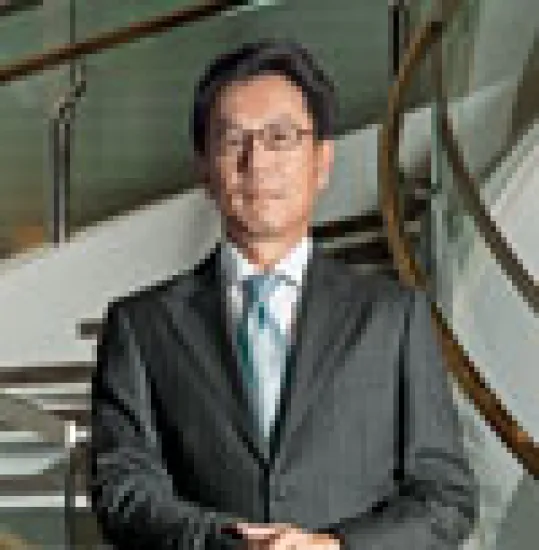When CEO Sandy Weill was looking to export Citigroup’s financial supermarket model to Asia a decade ago, he found a kindred spirit in Daniel Tsai. The executive, then co–vice chairman of Taiwan’s Fubon Group, was eager to turn the family-run financial enterprise into a Taiwanese mini-Citi, offering everything from banking to insurance to securities brokerage under one roof. Weill liked the idea so much that in 2000, Citi paid $850 million for a 15 percent stake in Fubon.
Much has changed in the ensuing years. Citigroup never managed to get its supermarket model working properly before Weill retired in 2006, and later it ran up such staggering losses on subprime mortgages and other toxic assets that it has needed three public bailouts in the past six months just to stay afloat. Weill’s successor Charles Prince sold the Fubon stake in 2007 in one of Citi’s early retrenchment moves. In Taipei, however, the Tsais have not only stayed true to the supermarket vision, but they are also taking advantage of the global financial crisis to expand their franchise at home and abroad. In December, Fubon Financial Holding Co., as the group is now known, became the first Taiwanese financial institution to take a stake in, and assume management control of, a mainland Chinese bank when it completed the 230 million yuan ($34 million) purchase of a 20 percent stake in Xiamen City Commercial Bank Co., a small retail lender in the port city of Xiamen, directly across the Taiwan Strait. Fubon aims to focus initially on serving the 2,450 Taiwanese companies and their employees in the Xiamen area, but it eventually wants to raise its stake there and expand regionally. In February, Fubon paid $600 million to acquire ING Group’s Taiwanese life insurance subsidiary. The deal strengthens Fubon’s position as the country’s second-largest life insurer, with 121 billion Taiwan dollars ($3.6 billion) in annual premiums.
Daniel Tsai, now the group’s executive chairman, has an appetite for still more deals in his drive to make Fubon a leading financial conglomerate in Taiwan, Hong Kong and China. "We would have at least $1 billion ready for more acquisitions if we find the right target," Tsai, 52, told Institutional Investor in a recent interview at the headquarters of the group’s banking arm, Taipei Fubon Bank. "We haven’t thought of abandoning the financial supermarket model yet. Maybe it’s because we still are buying things that are manageable."
Tsai’s boldness and ambition have enabled Fubon, Taiwan’s second-largest publicly listed financial services company by assets, with T$2 trillion, to stand out in the country’s overcrowded financial sector. Taiwan has 15 financial holding companies and 40 banks, half of them government-owned. That’s far more than this country of 23 million people needs, analysts say. But deals like the Xiamen and ING acquisitions have given Fubon powerful scope and scale, as well as a promising first-mover advantage in the fast-growing mainland market.
Taipei Fubon Bank is the country’s tenth largest, with T$1.2 trillion in assets. Fubon Insurance Co. ranks second in premiums and policies, behind Cathay Life Insurance Co., and is the fourth-largest insurer by assets, with T$1 trillion. Banking generated 54 percent of the Fubon group’s 2008 revenues of T$213.5 billion; property and casualty insurance contributed 20 percent; life insurance, 15 percent; and securities brokerage chipped in 11 percent.
The group’s breadth and strength are particularly important now that the recession in major developed countries is hammering Taiwan’s export-dependent economy. "Fubon likely will be the least affected by this economic crisis among Taiwanese financials because it is so diversified," says credit analyst Susan Chu of Taiwan Ratings Corp., a Standard & Poor’s subsidiary in Taiwan, which gives Fubon its third-highest credit rating, twAA.
The group faces stiff challenges ahead, though. Fubon’s net income declined 25 percent in 2008, to T$10.8 billion, partly because of T$2 billion in losses on investments in U.S. mortgage-backed securities and collateralized debt obligations. And with Taiwan’s economy nose-diving, the profit outlook is likely to worsen.
The country’s economic output shrank at an 8.2 percent annual rate in the fourth quarter of 2008 as export markets tanked, and so far there’s little sign of any upturn. Orders received by exporters fell by 44 percent in February from January. Only 1.6 percent of the banking system’s loans were nonperforming at the end of February, according to regulators, but Vincent Chang, an analyst with Goldman Sachs (Asia) in Taipei, cautions, "As this global crisis deepens, NPLs will rise."
Fears about the health of the system sparked runs on a couple of small private banks in October, prompting the government of President Ma Ying-jeou to initially double deposit guarantees to T$3 million before extending guarantees to all deposits and corporate loans in November. No banks have failed, and Sean Chen, chairman of Taiwan’s Financial Supervisory Commission, points out that the central bank holds T$4 trillion in excess reserves that could be tapped if needed. "We don’t have a liquidity problem," he tells II . "The challenge is coming from the external environment."
The government has taken dramatic steps to shore up the economy, the world’s 26th largest, with output of $393 billion and $300 billion in foreign exchange reserves. In January the government announced a T$500 billion fiscal stimulus program of infrastructure spending for 2009 through 2012. It also sweetened the budget with T$85 billion in consumption coupons — or T$3,600 (about $106) for every Taiwanese — that can be spent on any item but must be used by September.
"The crisis has had a huge impact on Taiwan," Finance Minister Lee Sush-der tells II in an interview. "We have taken emergency measures as well as come up with a future strategy of development." That strategy includes freeing up government-owned land for development and offering developers subsidized loans.
In addition to dealing with the troubled economic environment, Fubon needs to demonstrate that its supermarket model can generate strong profitability. The company sells, on average, 1.4 to 1.5 products per customer, more than its peers do but well below the cross-selling rate of five products or more for some European banks. The group’s return on equity was 6.7 percent last year, estimates Matthew Smith, an analyst at Macquarie Securities in Taipei. This trailed that of rivals such as Cathay Financial Holding Co. (10.8 percent), Mega Financial Holding Co. (10.0 percent) and Chinatrust Financial Holding Co. (8.5 percent). Fubon’s share price has fallen from a peak of T$36.79 last May to T$21.40 late last month, a drop of 42 percent; over the same period, Chinatrust was off 59 percent and Cathay 64 percent.
"Fubon is the most complete financial conglomerate in Taiwan," notes Smith. "But does it create value for shareholders? I’m not so sure."
Successfully integrating the recent Xiamen and ING acquisitions is essential to demonstrating the value of Fubon’s supermarket model. Tsai laid the groundwork for the Chinese purchase with an astute move into Hong Kong in March 2004, when Fubon paid T$13.9 billion for 75 percent of International Bank of Asia, a small lender formerly known as Sun Hung Kai Bank that was controlled by Arab Bank Corp. and China Everbright Bank. Tsai changed the name to Fubon Bank Hong Kong, doubled its branch network to 24 outlets and developed a range of services — including wealth management and securities brokerage — to cater to wealthy Taiwanese industrialists living in Hong Kong and running factories in China. Under Fubon’s control the bank’s assets expanded by 43 percent, to HK$65.6 billion ($8.5 billion); net income rose from HK$300 million in 2004 to HK$461 million in 2007 but fell to HK$100 million last year because of write-offs of bad corporate loans.
The Hong Kong bank generated just 3.2 percent of Fubon’s profits last year, but it proved far more valuable in giving Tsai a vehicle with which to skirt regulatory prohibitions on Taiwanese banks investing in China.
Cross-strait ties have improved under President Ma, who assumed office last May, and negotiators from Taipei and Beijing are expected to reach an agreement later this year to allow Taiwanese and Chinese banks to penetrate each other’s markets. But until then, Fubon has a front-runner advantage in servicing the more than 1 million Taiwanese entrepreneurs who have invested more than $150 billion in China. "Though this stake in this Chinese bank is a low contributor in terms of profits, the market will give Fubon credit for that," says Goldman Sachs’ Chang.
Xiamen City Commercial Bank is majority-owned by the government of Xiamen, a major city in southern Fujian province. The bank, a small retail specialist, has 17.7 billion yuan in assets and 32 branches, making it the fifth-largest lender in the city.
Tsai plans to appoint a new CEO, CFO and chief risk officer to Xiamen in the coming months. He also wants to expand aggressively into wholesale banking and serve the numerous Taiwanese manufacturers operating in the area. Longer term, Tsai says he is interested in taking a larger stake in the Xiamen bank and expanding it regionally, possibly into Shanghai. He also is eager to secure a life insurance license in China and cross-sell products through the bank. Cathay Financial has been selling life insurance in Shanghai since 2004 through a joint venture with China Eastern Airlines Co.
In contrast with his patient move into China, Tsai pounced quickly to acquire ING Antai Life Insurance Co. when the outfit’s Dutch parent company ran into trouble at the height of the credit crisis last autumn.
"This acquisition is opportunistic," notes Victor Kung, Fubon’s president. ING executives first approached Tsai about a possible deal in 2006, but they wanted a big equity stake in Fubon as part of the deal. In October, however, ING was obliged to take a €10 billion ($13.6 billion) capital injection from the Dutch government to ensure its solvency. Eager to free up the €450 million in capital it had tied up in Taiwan, the Dutch group agreed to sell its life business for T$19.5 billion in shares and subordinated securities that give it a 5 percent stake in Fubon. "We would not have taken it up if the price wasn’t right," Kung says. "The price came down because of the crisis."
ING Antai Life was the country’s fifth-largest life insurer, with 2.2 million customers and a 7 percent market share. It adds 8,000 agents to Fubon’s existing 2,000 life agents (the group has an additional 1,000 agents handling P&C business).
The deal helps Fubon close the gap on the country’s No. 1 life insurer, Cathay Life, and ups the competitive pressure inside the Tsai family. Cathay is a subsidiary of Cathay Financial Holdings, which is run by Daniel’s cousin, Tsai Hong-tu, estimated by Forbes to be Taiwan’s richest man, with a worth of $8.5 billion. Cathay and Fubon were each split off in 1989 to protect the Tsai family’s insurance interests from their bank at the time, Cathay Trust, which collapsed because of bad loans to a family manufacturing company. Both Cathay and Fubon have rebuilt financial services conglomerates; they are each other’s fiercest rivals in Taiwan. Cathay’s market cap of $7.2 billion is nearly twice Fubon’s $3.9 billion.
Some analysts question the terms of the ING deal because of outstanding liabilities at the company. Fubon’s Tsai begs to differ. He contends that Fubon has more than enough assets to absorb any losses down the road. He also believes that interest rates will hit bottom and rise eventually, and therefore final payouts on the policies will be lower than if they were paid today. Executives at ING declined to comment on the deal.
The ING acquisition helps balance out Fubon Life’s customer base, asserts Kung. The minimal overlap offers Fubon an expanded customer database for selling additional financial services. Fubon will train its 8,000 new insurance agents to persuade customers to apply for Taipei Fubon Bank credit cards and open Fubon Securities trading accounts, he says. "We will continue to use our distribution channel as one single platform to sell all products," Kung explains. "We continue to believe in the financial supermarket concept." Tsai echoes the point and offers a poignant contrast between Fubon and Citi, post-Weill. "After Sandy left, everyone we met at Citi — they cared more about their careers than [about] Citi," he says. "That is the big lesson we learned working with global giants like Citi. The culture is so different. In Oriental companies people like me stay around for a decade or two. In Anglo-Saxon companies chairmen and chief executives change all the time."






